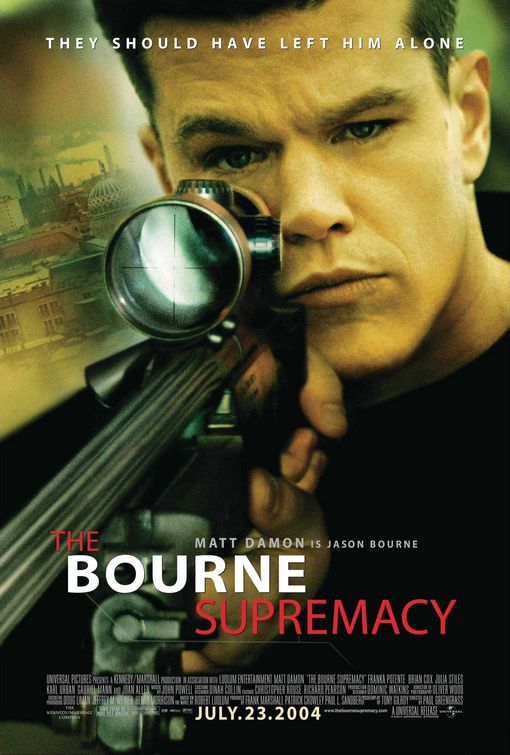“Survival of the Fittest”

| None | Light | Moderate | Heavy | |
|---|---|---|---|---|
| Language | ||||
| Violence | ||||
| Sex | ||||
| Nudity |
What You Need To Know:
THE BOURNE SUPREMACY is stylish and well paced. The acting, direction, camerawork, and music are executed with precision and build into a very entertaining film. On the other hand, the hero is amoral, if not immoral. Although Jason shows some remorse, he never submits to the authority of the state to face justice for his murderous sprees – and not everybody he kills is a bad guy. Media-wise families should ask just what kind of a hero is Jason Bourne, and do they want him to be a role model for their children?
Content:
(RoRo, B, APAP, LL, VV, S, N, A, M) Individualistic, Romantic worldview which presupposes that the individual is good at heart even when he’s a killer, and civilization is bad, with some expression of remorse, and some elements contain a negative, anti-patriotic view of the United States and its government; 15 obscenities and five profanities; lots of intense action violence, which should probably make the movie R-rated, including vivid gunshot wounds, impressive car crashes, drowning, prolonged fight sequences, strangulation, suicide with head blown off, visions of murder, and driving a car into another car to kill someone; kissing and caressing, but no other sexual activity; upper male nudity; barroom scene; and, of course, deception.
GENRE: Spy Thriller
More Detail:
Jason Bourne is hiding out from his former employer, the CIA, and everyone else, with his girlfriend in Goa, India. He is trying to remember his past since he is suffering from amnesia.
Meanwhile, in Berlin, Pamela Landy is about to bust up an illegal, high level, international money laundering scheme with connections to the government in Russia. Her superior tells her that she should be careful not to mess up because she’s spending a lot of money to capture these guys. Regrettably, for her and the CIA’s slush money, an unseen assassin penetrates the surrounded building and kills the two men she’s trying to capture, effectively destroying the operation. This assassin leaves a fingerprint, which belongs to Jason Bourne. Next, the assassin shows up in Goa and tries to kill Bourne, but kills Bourne’s girlfriend instead.
Bourne goes back to Europe to find out what’s happening and discovers he’s been framed. Therefore, he has to fight the CIA, the German police, the Russian police, the Secret Service, and almost everyone else to see if he can survive and turn the tables on the vast conspiracy intent on killing him.
The good news in this movie is that it is extremely stylish and well paced. The acting, direction, camerawork, and music are executed with precision and build the movie into a very entertaining film.
However, a little reflection exposes the plot holes. How does Bourne stay underwater so long with his dying paramour? How does Bourne take a ship 4,000 miles from Goa to Europe in one week? How does Bourne walk away from the entire Moscow police force and Secret Service after a tremendous multiple car wreck in an underpass? Etcetera. The movie moves so fast that you don’t bother to ask these questions in the midst of the action, but once you do, it becomes very funny.
On a moral side, however, it is not so funny. Bourne is an extreme Romantic individualist. Rousseauean Romanticism proposes that the individual is innately good and that it is civilization – by which Rousseau meant Christianity – which corrupts him. Bourne is up against the world and survives. The CIA is crooked, the governments are crooked, the police forces are crooked, and everyone else is bad. If the United States had a PR problem before, it will only be aggravated by this movie. That, however, is not a reason to be concerned with this rampant individualism. The reason to be concerned is because it puts the idea into the minds of young people that they’re right and everyone else is wrong, something that many youth have a propensity to think anyway in the immature stages of cognitive development. It is this Klebold and Harris thinking that is destructive to the fabric of society.
God does love the individual, so much so that He puts them into loving community – family, friends, schools, and nation – and He requires responsibility within those relationships. Self-government is the first stage of godly government.
Although Bourne shows some remorse, he never submits to the authority of the state to face justice for his murderous sprees – and not everybody he kills is a bad guy. Most of the audience will not question the philosophy of the movie. They will enjoy the eye candy. However, media-wise families should ask just what kind of a hero is Jason Bourne, and do they want him to be a role model for their children?


 - Content:
- Content: 




